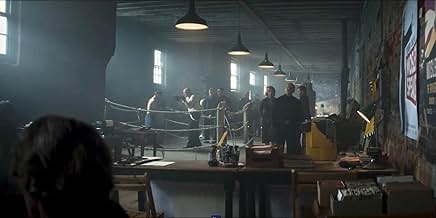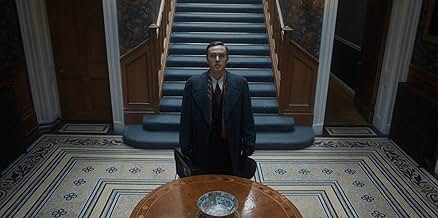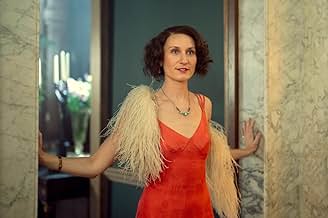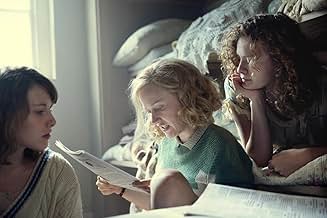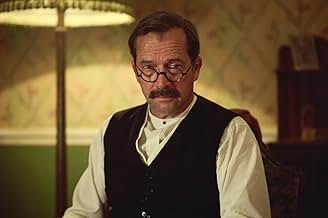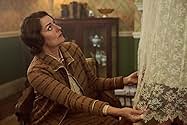Basierend auf der Geschichte der Mitford-Schwestern, sechs Schwestern, die sich weigerten, nach den Regeln zu spielen und deren oft skandalöses Leben weltweit Schlagzeilen machte.Basierend auf der Geschichte der Mitford-Schwestern, sechs Schwestern, die sich weigerten, nach den Regeln zu spielen und deren oft skandalöses Leben weltweit Schlagzeilen machte.Basierend auf der Geschichte der Mitford-Schwestern, sechs Schwestern, die sich weigerten, nach den Regeln zu spielen und deren oft skandalöses Leben weltweit Schlagzeilen machte.
Folgen durchsuchen
Empfohlene Bewertungen
I must say, my teeth were grinding even before I started to watch... reading that the Milford girls were 'independent minded rule breakers who threw off convention'. They weren't. They came from a background so privileged and entitled that the 'rules' others lived by were not even recognized by them. They didn't break rules knowingly, they were unaware of them.
The pre show blurb went on to speak of their lack of education, when in fact they were educated at home like so many women in history. A university education was never the only form of education. Their letters alone will tell any reader as much about what they did know as what they didn't.
The first episode, seemed to be the cliched cartoonish version of the English upper classes between the wars which holds sway with the chattering classes now.
But it did improve, its talented cast brought out some of the layers in their bilateral relationships, and the increasing clouds on the political horizons began to make their presence felt amidst the unfathomable stupidity of at least three of these under-employed but seemingly intelligent women.
What remains unpalatable (the commitment to fascism before, during and after the war of at least two of these daughters, and the similarly odd communist sympathies of another) is almost impossible to understand, other than to reflect on how divorced from the reality of most people they really were; by class, by design and by history.
Their characters are individually interesting when one reads their diaries, letters, work etc...but perhaps the story of these siblings cannot be told collectively without making it seem glib and crass, given its relationship to the sweep of history in the 20c.
The pre show blurb went on to speak of their lack of education, when in fact they were educated at home like so many women in history. A university education was never the only form of education. Their letters alone will tell any reader as much about what they did know as what they didn't.
The first episode, seemed to be the cliched cartoonish version of the English upper classes between the wars which holds sway with the chattering classes now.
But it did improve, its talented cast brought out some of the layers in their bilateral relationships, and the increasing clouds on the political horizons began to make their presence felt amidst the unfathomable stupidity of at least three of these under-employed but seemingly intelligent women.
What remains unpalatable (the commitment to fascism before, during and after the war of at least two of these daughters, and the similarly odd communist sympathies of another) is almost impossible to understand, other than to reflect on how divorced from the reality of most people they really were; by class, by design and by history.
Their characters are individually interesting when one reads their diaries, letters, work etc...but perhaps the story of these siblings cannot be told collectively without making it seem glib and crass, given its relationship to the sweep of history in the 20c.
Ninety percent of the dialogue in this series is given over to exposition -- characters conveniently explaining things to one another, describing events we never get to see, or summarizing various plot developments -- and this strictly functional dialogue (along with Nancy Mitford's voice-over narration) has to do a great deal of work, since the series is filled with all manner of events, comings and goings, whirlwind romances, debutante balls, weddings, break-ups, divorces, financial crises, political allegiances, trips abroad, spats between siblings, reconciliations, etc. -- so the whole busy story with its multiple points of view, though handsomely mounted, feels somewhat artificial and contrived.
However, the acting is so good, by virtually all concerned, that the series is quite likable and a pleasure to watch. I particularly admired Bessie Carter as Nancy and Shannon Watson as Unity, but all the cast was excellent, including the actors (though the men in the series tend to be a fairly caddish and inadequate bunch).
However, the acting is so good, by virtually all concerned, that the series is quite likable and a pleasure to watch. I particularly admired Bessie Carter as Nancy and Shannon Watson as Unity, but all the cast was excellent, including the actors (though the men in the series tend to be a fairly caddish and inadequate bunch).
This is a fantastic series telling the true story of the six Mitford sisters. One a famous author, two famous nazi lovers.
There is some great acting from most of the cast - the actresses playing Unity and Diana not so great. The real Diana was a renowned beauty and blindly admired Hitler. We don't see her beauty here. The peroxide blonde gives us a wooden performance and she delivers her lines in a monotone way. She doesn't move her face or mouth, maybe worrying about messing up her make up. The other sisters have great speaking voices but this actress attempts a cut glass accent and it doesn't work. Another actress would have portrayed her in a more natural way.
Nancy, the narrator is my favourite. A brilliant actress giving a natural performance.
The Battle of Cable Street put an end to Moseley's vision of a facist England.
There is some great acting from most of the cast - the actresses playing Unity and Diana not so great. The real Diana was a renowned beauty and blindly admired Hitler. We don't see her beauty here. The peroxide blonde gives us a wooden performance and she delivers her lines in a monotone way. She doesn't move her face or mouth, maybe worrying about messing up her make up. The other sisters have great speaking voices but this actress attempts a cut glass accent and it doesn't work. Another actress would have portrayed her in a more natural way.
Nancy, the narrator is my favourite. A brilliant actress giving a natural performance.
The Battle of Cable Street put an end to Moseley's vision of a facist England.
The Mitfords are one of, if not THE, most interesting families of the 20th century, so l've been waiting for this biopic for some time, even though much has been used in Nancy's biographic novels 'The Pursuit of Love' and 'Love in a Cold Climate', both of which have been adapted for television several times. Their story is seen through the eyes of the eldest Mitford, Nancy, the author and although the sisters bear no physical resemblance to the reality (that would be hoping for too much) the characters are fairly well defined, if a little bland in some cases. My grandfather met Nancy when a Bright Young Thing and took her to a party. I don't know what he would have made of this. What is missing is the distinctive Mitford drawl, which you can hear in interviews, obviously toned down for modern 'Estuary English' audiences. What redeems this series however is the love the sisters have for each other, even though often diametrically opposed to each other.
I have been fascinated by the Mitford sisters for some time. So it was good to see the characters fleshed out in a drama.
The story really centres around Nancy, Diana, Unity and the parents. The other sisters and brothers are bit players in the story. And as such it's hard to grasp who's who in the initial episodes.
All the actors do a great job and it looks great. The background of political turmoil in England and on the Continent which leads to conflict within the sisterhood is a major part of the storyline. Told through the eyes of Nancy, the narrative is clearly defined.
Although to most people these actresses sound posh. The real Mitfords were part of the Englush upper class. I recently saw an interview with Diana. She made these actresses sound like washer women.
The story really centres around Nancy, Diana, Unity and the parents. The other sisters and brothers are bit players in the story. And as such it's hard to grasp who's who in the initial episodes.
All the actors do a great job and it looks great. The background of political turmoil in England and on the Continent which leads to conflict within the sisterhood is a major part of the storyline. Told through the eyes of Nancy, the narrative is clearly defined.
Although to most people these actresses sound posh. The real Mitfords were part of the Englush upper class. I recently saw an interview with Diana. She made these actresses sound like washer women.
Wusstest du schon
- WissenswertesThe opening scene takes place in September 1931 and the closing scene of season one takes place in January 1937. Nancy ages from 26 to 32 years old; Pam was 23-29, Tom was 22-28, Diana was 21-26, Unity was 17-22, Jessica was 14-19, and youngest sister Deborah was 11 to 16 years old during this time period.
Top-Auswahl
Melde dich zum Bewerten an und greife auf die Watchlist für personalisierte Empfehlungen zu.
- How many seasons does Outrageous have?Powered by Alexa
Details
Zu dieser Seite beitragen
Bearbeitung vorschlagen oder fehlenden Inhalt hinzufügen




